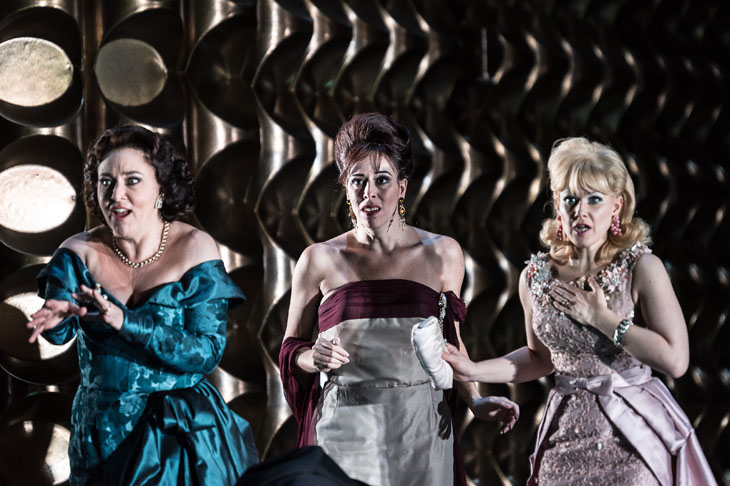The Adèsives were out in force at Covent Garden last Monday for the UK première of their hero’s third opera, The Exterminating Angel, unable to contain their rapture until the piece was over, yelling their excitement even at the interval. Thomas Adès’s opera is closely based on Buñuel’s film of 1962, with the text adapted by the composer and Tom Cairns, who also directs the production, which was first seen last July in Salzburg, with a cast mainly identical to the Royal Opera’s.
I hadn’t seen it before Monday, but have listened several times to my pirate recording and hoped that seeing it (with indispensable surtitles) would clarify the opera for me and help me to sort out my responses. It didn’t — excellent, indeed exemplary as the production is — and has left me feeling confused and uneasy about the piece. The sheer fact that it is an adaptation of a notorious surrealist film forced me to reconsider my attitude to that movement, but I have reached the same view that I have long held: surrealist art is pretentious, vapid, trivial and boring. I know that its point is to unsettle us, but it does so in only a superficial way, the clearest example of that being Dalí, with whom of course Buñuel had earlier collaborated.
The Exterminating Angel, as everyone must now know, is about a dinner party attended by a mainly loathsome collection of people: posturers, fakes, who are frivolous and, worst of all, bourgeois. It begins with the servants scenting that something is wrong and quitting the scene, so that the guests have to fend for themselves. What is worse, they find that they are unable to leave, though what kind of force it is that constrains them is never even hinted at. Creating and sustaining bewilderment, and leaving us unsure about how serious it all is, is a key element in surrealism, but it is one of those things that really can’t be done more than a few times before tedium sets in.
For me, it set in fairly quickly, in Act One, and remained until the end of Act Two. It was replaced by interest and fascination in Act Three, which strikes me as by far the finest both musically and dramatically. Adès conducts with fervour and, of course, authority, and has relaxed the tempi, so that this performance lasted a quarter of an hour longer than the Salzburg première, mainly to its advantage.
Working with what is now a highly experienced team, Adès left no doubt that what we saw and heard was exactly what he wanted us to. Charles Workman, Amanda Echalaz, Thomas Allen, Christine Rice, Anne Sofie von Otter, Sally Matthews, Iestyn Davies, Sophie Bevan, John Tomlinson, to mention only some of the cast, more or less guarantee that the early performances of this opera are as fine as any will ever be. Yet I felt their talents weren’t being put to good use in the first two acts, because they were largely yelling banalities at one another over a busy and often fascinating orchestral accompaniment — that’s the wrong word really, since it seems to go its own way. In this respect, if no other, Angel reminded me of Janacek’s The Makropulos Case. What did the dialogue among the innumerable characters gain by being sung? The kind of pitched declamation Adès gives them makes them seem to be perpetually on the verge of hysteria — quite often they are, but that doesn’t make them much fun to listen to.
It would be wrong to say that things calm down in Act Three, but hysteria has mainly given way to despair, and the music becomes much more beautiful than for most of the preceding acts. There is genuine pathos in the guests’ gratitude to a water pipe that they manage to fracture, so finally getting some liquid. The relentless parodying of the music is succeeded, for long stretches, by solemnity and a kind of hieratic quality which is the more moving because we have been deprived of it for so long. Adès even employs some words from the Latin requiem to powerful effect.
The ending is sudden and almost shocking. But it leaves us — it left me — with a bewildering sense that I didn’t know how to take the opera: is it, in the end, a compassionate portrayal of ‘the human condition’? Is this mainly unsavoury collection of characters meant to be of universal significance? Is it possible to combine, as the work seems to be doing, satire, pastiche and real solemnity? These are questions one might equally ask of Stravinsky’s The Rake’s Progress, an opera Adès adores and has conducted, but though it now has classic status it seems to me broken-backed. It will be interesting to see if The Exterminating Angel achieves the same status.






Comments